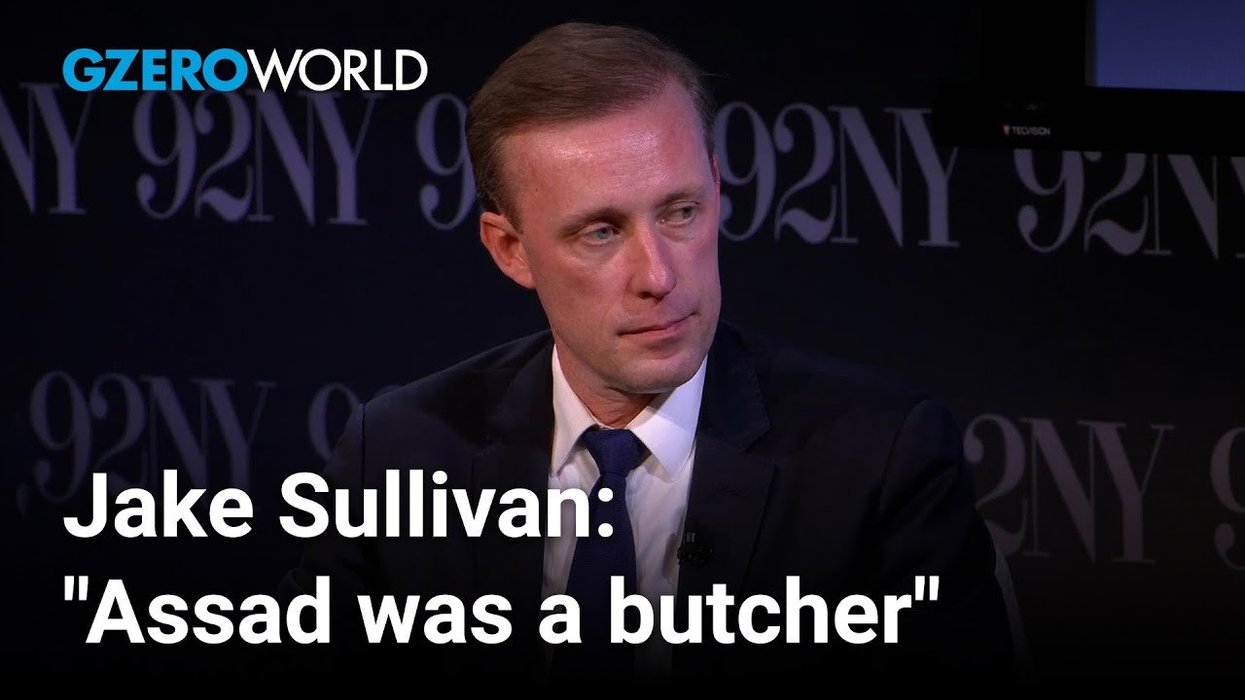TRANSCRIPT: The Top Global Stories of 2019 | GZERO World with Ian Bremmer
Susan Glasser:
Washington doesn't work. It hasn't worked in a long time, and that's been a gradual process, of course, that has now been put on steroids by the divisions of the Trump era and a president who sort of inflames them gleefully and willfully.
Ian Bremmer:
Have you noticed after news of trade wars, real wars, populism, climate change, a Mueller investigation, impeachment, and a fresh batch of US presidential candidates, it all just starts to blend together? Well, if you're looking to make sense of 2019, this is your show. Actually, it's my show. Hello and welcome to the GZERO World Podcast, where you'll find extended versions of the interviews from my show on public television. Today on the podcast, I speak with acclaimed journalist, Susan Glasser of the New Yorker, to discuss the year ahead, particularly one of the world's biggest political stories, the impeachment of Donald Trump. Glasser has the chops for some much needed context. She oversaw impeachment coverage of Bill Clinton for the Washington Post, and spent four years in Moscow as the paper's co-bureau chief. Let's get to it.
Announcer:
The GZERO World Podcast is brought to you by our founding sponsor, First Republic. First Republic, a private bank and wealth management company, understands the value of service, safety and stability in today's uncertain world. Visit firstrepublic.com to learn more.
Ian Bremmer:
Susan Glasser, New Yorker magazine, "Letter from Trump's Washington." Everyone's reading it. Glad to be with you.
Susan Glasser:
Lots of material, as they say.
Ian Bremmer:
As an insider in the Beltway, how is impeachment playing out behind the scenes?
Susan Glasser:
Well, it's interesting. I do think it's a very different story in Washington, than it is around the country. Understandably, the rest of the country, the rest of the world, it's not their job to-
Ian Bremmer:
Low ratings.
Susan Glasser:
... to take in every fact.
Ian Bremmer:
Low ratings.
Susan Glasser:
I think there are probably low ratings for lots of previous Washington hearings, including this one.
Ian Bremmer:
Absolutely. Yeah.
Susan Glasser:
I don't think that's any surprise, really, but I do think that it's coming at a time when the ability to create any kind of national consensus over the facts is so diminished. People just throw up their hands. I can't make hide nor hair of it. Even people on both sides, by the way, I think this is both Democrats and Republicans. Again, I'm talking outside the Beltway, where people whose job it is not to focus on it. Democrats may support impeaching and removing Trump because they loathe President Trump. Republicans may support him remaining in office. I think their views of impeachment tend to be highly colored by their preexisting views of Trump himself at this point.
Ian Bremmer:
On both sides?
Susan Glasser:
Yeah, I worry that neither side is really taking in the full impact of this story, and I think one of the main reasons, and I went actually last week right before Thanksgiving, and I attended a couple focus groups outside of Washington in central Pennsylvania among Trump voters who were now disillusioned in various degrees with him. And it was really fascinating, as you might imagine, but the big takeaway that we tend to forget here in Washington, is, the rest of the country's deep, deep cynicism. They actually think that perhaps President Trump didn't do anything really wrong here because they think all politicians do this, and they think they're all this corrupt. And so, of course here inside the Beltway, even many Republicans of course would say, "Whoa, we've never heard of anything like this." I thought it was a very powerful moment in the testimony when Bill Taylor, who is the senior diplomat, US diplomat now on the ground in Ukraine, and he was asked...
Mr. Goldman:
Ambassador Taylor, in your decades of military service and diplomatic service representing the United States around the world, have you ever seen another example of foreign aid conditioned on the personal or political interests of the President of the United States?
Bill Taylor:
No, Mr. Goldman, I have not.
Susan Glasser:
And of course they asked all the other witnesses as well. They all said they'd never seen anything like that.
Ian Bremmer:
So now that we are through the lion's share of the House, and certainly the public piece is out, so we know what the arguments are, has that changed views of people in the Beltway? Not only about whether or not Trump, "Did it," but as to whether or not it matters? Again, we now kind of know what it is.
Susan Glasser:
Yeah. I don't see that there's a lot of argument about whether or not Trump did it, even-
Ian Bremmer:
That's what I'm saying, not about that-
Susan Glasser:
Yeah.
Ian Bremmer:
I'm saying it's a change of views.
Susan Glasser:
I think a couple things. One, it continues to be for Beltway watchers, people who are watching in particular the ongoing owning of the Republican Party on Capitol Hill by Trump, it is kind of breathtaking to watch even, one by one, even people who were perceived to be moderate or who've been more critical of Trump in the past, fall in line in supporting him, number one. Number two, to watch some of the arguments that Trump has insisted that his defenders use on his behalf-
Ian Bremmer:
The call was perfect.
Susan Glasser:
It's breathtaking-
Ian Bremmer:
For example.
Susan Glasser:
Not only that, but he actually has them arguing with a straight face. There was a 123-page prebuttal report issued the other day by Republicans on the House Intelligence Committee. Their argument there is that Donald Trump is a noble corruption fighter in Ukraine. This obviously does not really pass the smell test for anybody of any party. It's not a plausible argument-
Ian Bremmer:
Is your assumption that the Senate is now going to bring those sorts of arguments up, bring those sorts of witnesses up? In other words, do we expect a radically different process? Process. Topics. In Senate.
Susan Glasser:
Well, it's a good question. Up until now, the conventional view has been that we would see a somewhat more serious approach in the Senate-
Ian Bremmer:
Because it's Senate.
Susan Glasser:
... and that even Republicans who ultimately would fall in line and vote to acquit the President, would A, probably express some concerns about his behavior and would B, basically adopt the argument that while this behavior was problematic, or concerning, or troublesome, or even perhaps worthy of censure, that it was not impeachable, which is very different than the defense advanced by the President himself and his allies in the House, who tend to be much more rabid.
Ian Bremmer:
That it's a witch hunt, and there's nothing there.
Susan Glasser:
The key dynamic to remember is that Mitch McConnell as a Senate majority leader, has long been sort of one of the underappreciated, probably most powerful person in Trump's Washington. He has been guided by one principle and one principle alone really over the last few years, which is the maintenance and preservation of his Republican majority in the Senate. He has Republican incumbents up for reelection in states that are very unfriendly to Trump, like Colorado, for example, or Susan Collins...
Ian Bremmer:
In Maine.
Susan Glasser:
In Maine.
Ian Bremmer:
My understanding of the conventional wisdom, right until it's wrong, as you say in Washington-
Susan Glasser:
Yes.
Ian Bremmer:
...is that the likelihood of a Senate conviction is zero. Is that correct?
Susan Glasser:
Maybe not zero, but certainly it's very, very low. You need 20 Senate Republicans to break ranks, given that even getting one has tended to be an uphill battle. You've seen this weird situation in recent years where there's the decline of institutional power in the American political parties. At the same time, this polarization means that people are more identifying as partisans than ever before. So you see the parties hanging in line more than ever before. I mean, there were 31 House Democrats who voted at least to open the inquiry into the Clinton impeachment. Many of them didn't ultimately vote to impeach him. That kind of behavior was normal during the Reagan era. Now, it's unthinkable. Washington doesn't work. It hasn't worked in a long time, and that's been a gradual process, of course, that has now been put on steroids by the divisions of the Trump era and a president who sort of inflames them gleefully and willfully.
Ian Bremmer:
Now, you've said that Trump reflects the greatest geopolitical threat in the world today. Now, you're someone who used to recognize very clearly that the Soviet Union was, right, the biggest geopolitical threat in the world. How do we go from an empire to a guy?
Susan Glasser:
Well, that's part of it, right, is that I think the uniqueness of having an authoritarian-minded leader of the United States and sort of titular leader of the free world, if you will, he's essentially made that a meaningless term. And so to me, I do look at the foreign policy landscape, and I see obviously a lot of important macro-long-term trends happening. But the most important of those, I would argue, was the long-term decline, relative decline of both American power and American leadership in the world. So therefore, to have an American president who has such an uncertain course, an ambivalent course, toward the major remaining institutions of American leadership and alliances in the world at a time when there's no obvious thing to replace them, except for sort of rising adversarial powers like Russia and China, I think the destabilization of the world's remaining democratic small-d leader, is an unbelievably consequential story, and Americans tend to focus on the circus-like atmosphere of Trump.
Susan Glasser:
They tend to focus on, understandably, the domestic political consequences. You look at a country where 35,000 people are shot dead every year, where our school children are taught to run under their desks and hide from active shooter situations when they're in kindergarten, and our legislature at the national level is powerless and unable to act. I mean, that's almost the definition of gridlock and a failure to do anything for the public safety. So that, understandably, that domestic political tumult and gridlock tends to be the focus of the conversation even here in Washington.
Ian Bremmer:
So, leaving this impeachment aside, now we're looking ahead towards 2020. Your crystal ball, what do you think the biggest issues are going to be in the general election? Give me two or three of them.
Susan Glasser:
Well, Trump, Trump and Trump would be issues one through three, at least for a pretty big chunk of the electorate. And you are already seeing that numbers off the charts, in some ways actually in both parties, by the way. You are seeing this motivation to vote, for example, is extraordinarily high, and I think is due to the polarizing personality and politics of this particular president. So most elections in which an incumbent is on the ballot do tend to be referenda on...
Ian Bremmer:
On that person.
Susan Glasser:
... those incumbents, exactly. If it is a referendum on Trump, it's likely to be good for the Democrats next November. But they're the Democrats, so never underestimate their capacity to screw it up.
Ian Bremmer:
So in that regard, all of the Democrats out there that are saying, "We need to be focused on issues," your view is actually not that. Yours is, make it a strong referendum on Trump. Get people to turn out.
Susan Glasser:
Well, I mean, again, they are responding to polling that people's views are fixed on Trump, and so they're also trying right now to gain advantage in a very crowded Democratic primary, where it's assumed that the primary voters are against Trump. So the campaigns they're running in the primary are not necessarily the campaign that they would run in the general election.
Ian Bremmer:
That'll change.
Susan Glasser:
Yeah, exactly. I mean, I do think you asked about the conventional wisdom in Washington. The conventional wisdom right now, is very much among, I would say, Democrats, Republicans, journalists, that Trump shouldn't win, but somehow will...
Ian Bremmer:
Will.
Susan Glasser:
And that he's winning. And that is a feeling of discomfort with how the Democratic primary has played out so far. Perhaps it's a sense of unease with the nature of the Democratic field that has already brought in late entrants like Michael Bloomberg and Deval Patrick, neither of whom seem to be emerging, by the way, as any kind of savior of the Democrats. So I say that just as a sort of baseline setting. We can say that here in December of 2019, again, the Washington conventional wisdom is almost always wrong, so I'm fascinated to see what way it will turn out to be wrong. But right now, that's the view.
Ian Bremmer:
Now, when we look ahead at 2020, what actually concerns you the most?
Susan Glasser:
Well, you'll hear a lot of people say that a two-term Trump presidency is way more consequential and way harder to recover from, than a one-term Trump presidency. And because we have very little sense of what his actual agenda is, either legislatively or just in a bigger picture policy sense, he clearly wants to do bigger and more disruptive things, even in his first term than he's been able to do. Remember that there's been just epic levels of, sort of dysfunction, incompetence, turnover on the staff has been so high. It's very hard to get anything done when people are cycling in and out. When the core cadres, professional cadres of even your own Republican Party have basically refused to serve under you, or those who have tried have been thrown out or run through the meat grinder, that makes it very hard to enact any program, especially one as disruptive as Trump's is potentially. And so the question would be in a second term, both what is the agenda, and will he have better prospects for following through on some of those really transformative things?
Ian Bremmer:
If you have the ability to be reassured by something that matters, consequential, going into 2020, US politics, it's what?
Susan Glasser:
Look, I'm really looking to see what role, if any, the courts play and the Supreme Court plays on some of these core issues of executive power over the next few months. One aspect of the Trump era, which is not surprising if you look at Trump's history as a private businessman and his very litigious nature, but we're looking at a record number of really significant constitutional challenges that are making their way through our court system that delineate what kind of power and authority Donald Trump and future presidents as a result would have. Everything from being required to turn over his tax returns to Congress, which is one of the cases making its way through, his ability to continue to make money from foreign officials and governments while in office, his ability to defy subpoenas of Congress for himself and his administration in the course of the impeachment proceedings.
Susan Glasser:
I think that we will really understand a lot more what kind of democracy we're left with when we see what, if anything, the Supreme Court with its now five-to-four Republican majority has to say about that. Chief Justice John Roberts takes great umbrage at the notion that there's such a thing as Republican justices and Democratic justices, and he will also be called upon to preside personally over this Senate impeachment trial. But will he really be able to command a majority to reign Trump in, will there be any decision like the landmark Nixon versus United States decision? That was one of the culminating events of Watergate.
Ian Bremmer:
But you feel good about that? If we-
Susan Glasser:
Well, we'll see.
Ian Bremmer:
Well, I was asking what reassures you, so if you're being reassured by it...
Susan Glasser:
Yes, I would be reassured.
Ian Bremmer:
Yes.
Susan Glasser:
If both the Congress and the judiciary took steps, especially in this very difficult environment, to assert the prerogatives of a democracy that's of laws and not of men. I think that would be a pretty big deal.
Ian Bremmer:
Okay. To close this out, we've got to do a lightning round.
Susan Glasser:
Okay.
Ian Bremmer:
I'm going to ask you some random questions about Washington. You're going to give me answers real fast.
Susan Glasser:
All right.
Ian Bremmer:
Okay. Whatever comes to mind.
Susan Glasser:
This is word association.
Ian Bremmer:
Yeah, sort of like that. Yeah. So first off, Susan Glasser, first of all, Mike Pompeo, secretary of state, does he run for Senate?
Susan Glasser:
I think he wants to, yes.
Ian Bremmer:
You think he does. Who is, among the 30,000 people that have run for the Democratic nomination, which is the one that hasn't run that you really would have liked to have seen in the race?
Susan Glasser:
I'm a fan of Mitch Landrieu. He-
Ian Bremmer:
From Louisiana?
Susan Glasser:
From Louisiana.
Ian Bremmer:
Former Mayor of New Orleans.
Susan Glasser:
I am.
Ian Bremmer:
Have you gone to the international Trump Hotel to get scoops or overhear people in the administration, just hear anything?
Susan Glasser:
I have been there only a couple times. I did encounter very interesting things when I went there, but it's basically a very large, often empty, gigantic room with many, many screens of television all tuned into Fox.
Ian Bremmer:
Okay. If you had to leave Washington, DC, and had to cover the politics of one state in our nation for the coming electoral cycle, it would be what?
Susan Glasser:
Texas.
Ian Bremmer:
Because?
Susan Glasser:
I don't know, is it going to turn blue again? I don't think so. Maybe not this cycle, but it's a pretty interesting state.
Ian Bremmer:
Okay. And who's going to get the nomination on the Democratic side?
Susan Glasser:
I don't know.
Ian Bremmer:
Your gut.
Susan Glasser:
Who do you think?
Ian Bremmer:
What's your gut tell you? I'm interviewing you. You get to ask me next time.
Susan Glasser:
Joe Biden has not performed well, but he might just pull it out.
Ian Bremmer:
He might just pull it out, and his running mate would be?
Susan Glasser:
He's saying a lot of nice things about the recently departed Kamala Harris, isn't he.
Ian Bremmer:
He has indeed. Susan Glasser, wonderful to be with you.
Susan Glasser:
Thank you.
Ian Bremmer:
That's it for the podcast this week. We'll be back in your feed next week. Check out full episodes of GZERO World on public television, or gzeromedia.com.
Announcer:
The GZERO World Podcast is brought to you by our founding sponsor, First Republic. First Republic, a private bank and wealth management company, understands the value of service, safety, and stability in today's uncertain world. Visit firstrepublic.com to learn more.







